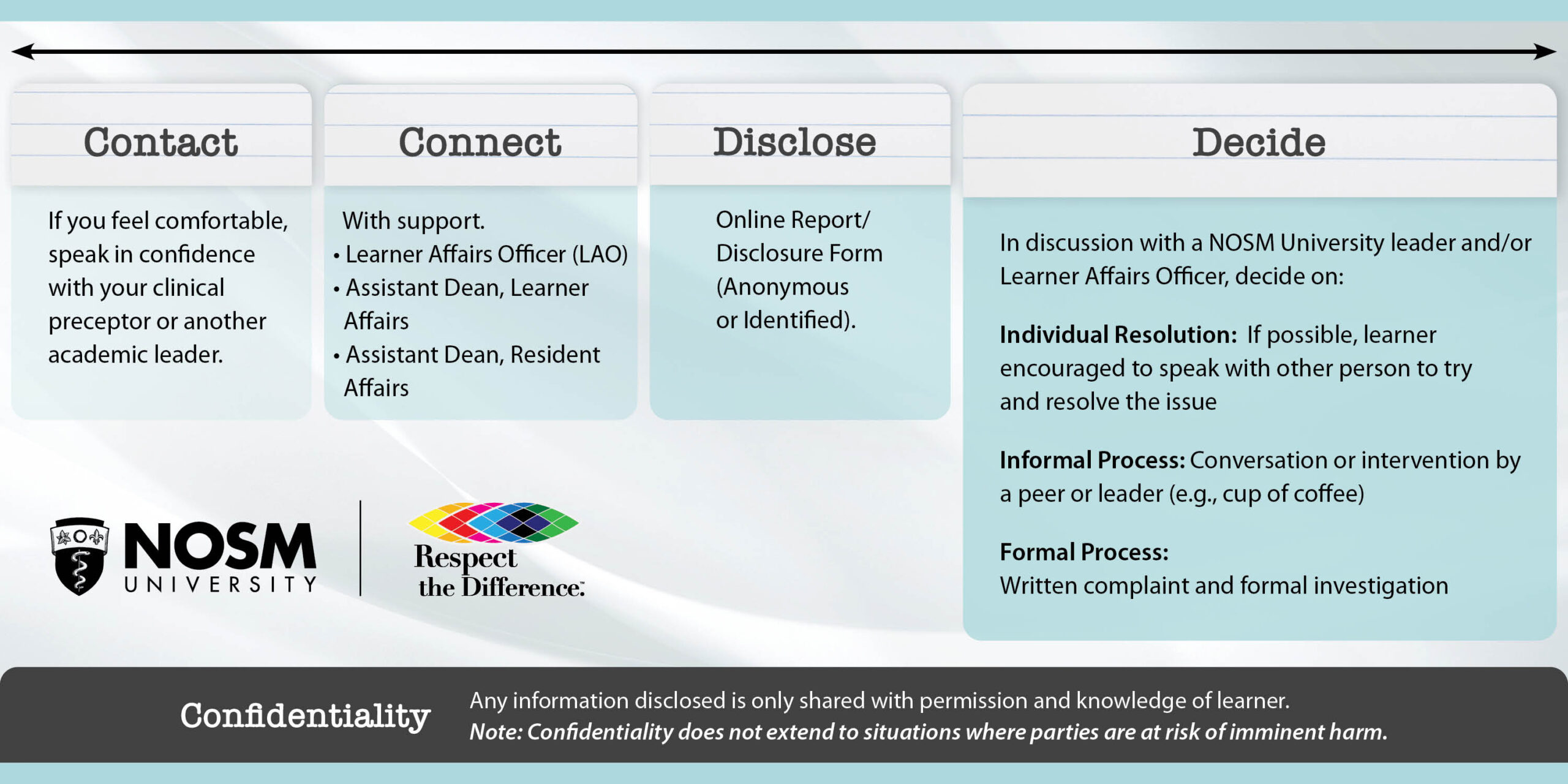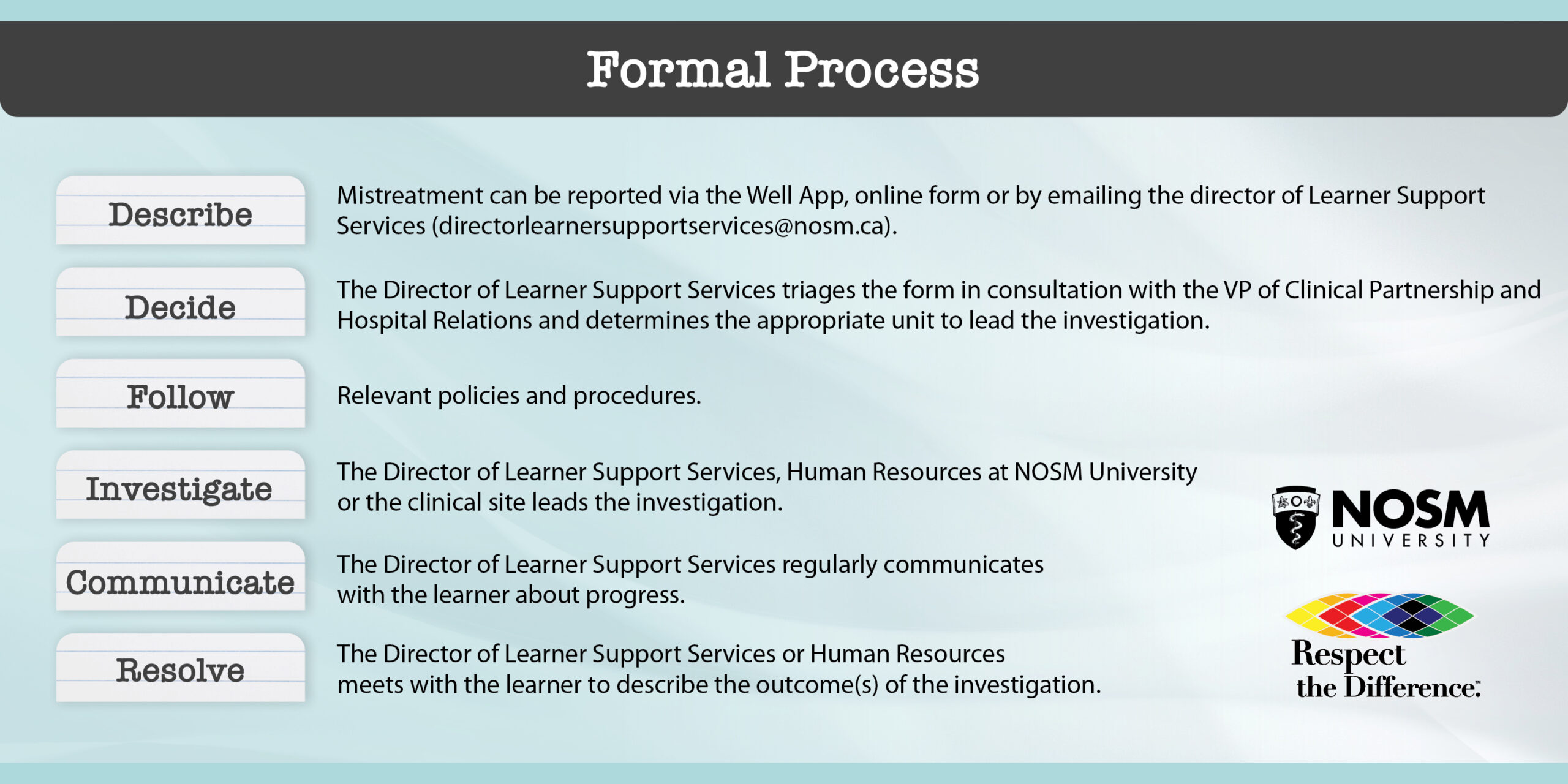Addressing Learner Mistreatment
NOSM University is committed to excellence in teaching, learning, and research and to the maintenance of a learning and work environment which promotes understanding and respect for dignity. As part of the NOSM University community, individuals have the right to an environment that is free from harassment and discrimination while protecting academic freedom including the rights of freedom of expression and inquiry.
NOSM University's policy on Human Rights and Anti-Discrimination states that mistreatment, either intentional or unintentional, occurs when behaviour shows disrespect for the dignity of learners and unreasonably interferes with their learning. Mistreatment of learners is contrary to the values of NOSM University. NOSM University upholds its values, in a learner-centred environment, by empowering the agency and self-determination of a learner to identify and address mistreatment.
*The Association of American Medical Colleges
Any instance of discrimination, humiliation, harassment, inappropriate or unethical behaviour experienced or witnessed by a student or resident that negatively impacts their learning environment. Mistreatment is encompassed by the instances that make you feel uncomfortable, and this website is here to help you unpack that discomfort and find solutions.


Mistreatment or unprofessionalism?
It can sometimes be difficult to distinguish between what constitutes mistreatment, and what does not. Mistreatment is always unprofessional. Unprofessionalism does not necessarily involve mistreatment.
Consider the Declaration of Professionalism, which establishes a set of core values by which medical students, faculty, residents, allied health care professionals and staff are expected to live. These include:
-
-
- Honesty and integrity
- Altruism and respect
- Responsibility and accountability
- Compassion and empathy
- Dedication and self-improvement
-
Not all of these core values of professionalism involve mistreatment. For example, if a professor repeatedly cancels a lecture at the last minute, it is seen as unprofessional. Similarly, recurring tardiness constitutes unprofessional behaviour. These examples are not illustrative of mistreatment but do put into question the professional conduct of an individual.
Not Mistreatment or Mistreatment?
The Pritzker School of Medicine developed the following set of examples to help students and faculty better understand what does, or does not, constitute inappropriate behaviour or mistreatment.
|
M |
Malicious intent |
|
I |
Intimidation on purpose |
|
S |
Sexual harassment |
|
T |
Threatening verbal or physicial behaviour |
|
R |
Racism or excessive discrimination |
|
E |
Excessive or unrealistic expectations |
|
A |
Abusive favours |
|
T |
Trading for grades |
Examples of mistreatment
- Public belittlement or humiliation
- Requiring performance of tasks intended to belittle or humiliate
- Conduct intended to insult or stigmatize a student
- Intentional neglect
- Verbally abusive language
- Inappropriate anger
- Offensive remarks based on gender, race/ethnicity or sexual orientation
- Threats of physical harm or actual physical punishment (e.g. hitting, slapping, kicking)
- Requirements to perform personal services (e.g. shopping, babysitting)
- Being denied training opportunities based on discrimination (gender, race/ethnicity, religion, sexual orientation, age, disability)
- Unwanted sexual advances
- Use of professional position to engage in romantic or sexual relationships
- Asking for sexual favours in exchange for grades
- Giving lower grades based on discrimination (gender, race/ethnicity, religion, sexual orientation, age, disability
